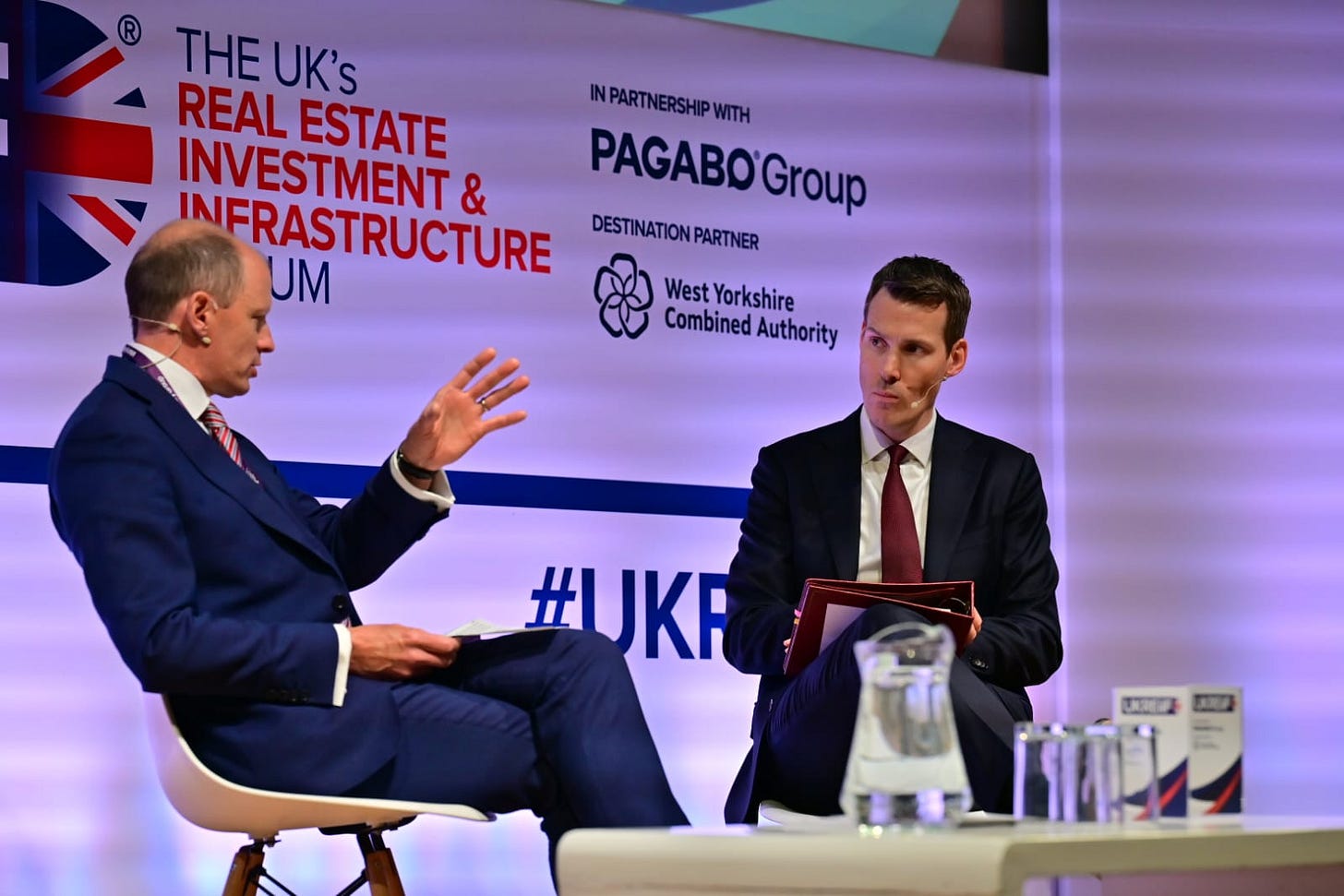UKREiiF Dispatch: why transport must drive growth, not choke it
Greater Manchester mayor Andy Burnham calls for big investment in transport infrastructure in the upcoming Spending Review.
Better comms for people, places and work
This week, we’re sharing daily updates from UKREiiF - the UK’s biggest event focused on property, investment and regeneration.
We hope it helps our contacts stay connected to some of the discussion points. Our regular Dispatch returns on 6 June.
As ever, we hope you find our newsletter useful. If you have thoughts or suggestions on what you’d like us to cover in the future, let us know in the comments or get in touch.
Why transport must drive growth, not choke it
“Funding for transport is essential to growth. Cutting transport is choking growth.”
Greater Manchester Mayor Andy Burnham’s message on the importance of reliable, affordable, good travel options into and between cities sets out a challenge to government three weeks ahead of the Spending Review.
Mr Burnham spoke on a panel discussion about transport infrastructure, explaining recent changes to Greater Manchester’s Bee Network bus service, which Greater Manchester Combined Authority runs.
Operating a regional public bus franchise makes the service more accountable and reliable while kick-starting a culture change, he said. Adding weight to quality over price to bus service contracts is helping to drive improvements, he added.
“Public control starts to change everything about the pace of delivery,” said Mr Burnham.
Anyone who’s tried using public transport to get around the country knows that the pace of delivery needs to step up before people get out of their cars and onto more sustainable modes of travel.
First Bus managing director Janette Bell, whose company runs services for 1.5 million passengers a day, said that the average speed of those services is around seven miles an hour.
Others delegates I’ve spoken to recount grisly stories of cramped carriages with no working toilets or places to sit on trains to Leeds.
It’s no great surprise, therefore, to hear that a basic straw poll of attendees found that around 40% of respondents had driven to UKREiiF this week. For an event with 16,000 attendees, that’s no endorsement of our transport system.
And it’s why bodies like Business West regularly report transport as the number one bugbear amongst its members.
Bus back better?
Minister for Local Transport Simon Lightwood spoke before the panel session of government efforts to provide ‘better buses everywhere’ as part several measures to provide better, joined up travel.
Investment of £300 million for active travel, creating Great British Railways to oversee services and train tracks, and giving local authorities more control over transport all feature on the roadmap.
The Spending Review on 11 June is a key marker on the journey to better public transport.
But change also needs to happen quickly if people are to start trusting and using public transport services.
With quick wins in mind, I asked the five panellists what changes they’d like to see by this time next year.
Sarah Spink, Midlands Connect’s Strategic Partnerships Lead, mentioned progress on the Midlands Rail Hub.
Andy Burnham opted for bringing Glossop in the Peak District into the Bee Network, connecting the area to Manchester Piccadilly.
Laura Shoaf, chair of Great British Railways’ shadow board, mentioned service improvements and more people travelling by train (aka ‘modal shift’).
Janette Bell mentioned service improvements and progress on bus fleet electrification.
Alex Hinchcliffe, Mer managing director, called for investment in making charging points more accessible and affordable.
Here’s hoping for progress on all these points, and others. Wishing everyone safe and stress-free travel in the meantime.
Connect with us at UKREiiF
We’ll be at UKREiiF until tomorrow (Thursday) afternoon, and aim to provide another newsletter tomorrow.
If you’re in Leeds and want to catch up, of if you’d like to share or discuss anything, please leave a comment or drop us a line.
Things we’ve heard
“If we fail on the 1.5 million [new homes target for England], or if we succeed in hitting the 1.5 million but it’s at any cost, we will have failed. And no government will ever touch this challenge again.”
Housing minister Matthew Pennycook (pictured, below) explains why success is about more than hitting the housing numbers. Reforming the planning system to enable swifter progress should come with good quality new development, he said.
“The key thing is communication. You can’t have change if people don’t understand what you do.”
Tritax Big Box Developments’ director Katie Howe during a Midlands Engine panel discussion on sustainable development.
“We’re delivering 25,000 homes in the next five years. We could do twice that number if we have investment coming in.”
Homes for the South West board member and Magna Housing Group chief executive Selina White at the launch of the regional housing prospectus.






